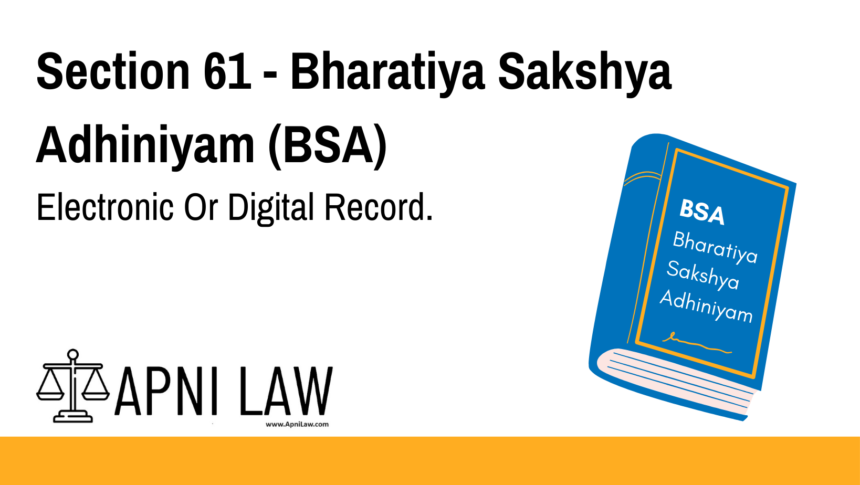Code: Section 61 BSA
Nothing in this Adhiniyam shall apply to deny the admissibility of an electronic or digital record in the evidence on the ground that it is an electronic or digital record and such record shall, subject to section 63, have the same legal effect, validity and enforceability as other document.
—
Explanation of Section 61 BSA
Section 61 of the Bharatiya Sakshya Adhiniyam (BSA) affirms the legal acceptance of electronic and digital records as valid evidence in Indian courts. It reinforces the principle that digital or electronic records cannot be rejected solely because they are in a non-physical format.
This section is pivotal in the digital age, where most records, including contracts, communications, and transactions, are created or stored electronically. Section 61 ensures that these records are not discriminated against in judicial proceedings and that they carry the same evidentiary value as traditional paper-based documents—provided they meet the authenticity requirements laid out in Section 63 BSA.
Key Highlights:
-
Admissibility: Digital records are fully admissible in court.
-
Equal Status: These records have the same legal effect, validity, and enforceability as physical documents.
-
Conditional Validity: Admissibility is subject to compliance with Section 63, which outlines how electronic records must be authenticated.
—
Illustration
Example 1: Email as Evidence
An email conversation between two parties about a business deal is presented in court. Under Section 61, this email is admissible and treated like any other document, as long as its authenticity is verified under Section 63.
Example 2: Digital Invoice
A company submits a digitally signed invoice stored in PDF format. The invoice cannot be rejected merely because it’s in digital form. It is admissible as long as it meets authentication standards.
—
Common Questions and Answers on Section 61 BSA
-
Are digital documents as valid as physical documents in court?
Yes. Section 61 confirms that electronic or digital records are treated as equivalent to physical documents in terms of evidentiary value.
-
Can a WhatsApp message or email be submitted as evidence?
Yes, provided it meets the authentication requirements under Section 63. It must be shown to be genuine and unaltered.
-
What if a digital record is challenged in court?
The party submitting it must prove its integrity and origin. Section 63 provides the necessary procedures to validate such electronic records.
-
Does Section 61 override other provisions of the BSA?
Yes, to the extent that no other provision in the BSA can be used to deny the admissibility of electronic or digital records solely on the ground of their format.
-
Is a digitally signed document stronger evidence than a scanned copy?
Yes. A digitally signed document that meets the standards of the Information Technology Act and Section 63 of the BSA typically has stronger probative value than an unsigned scan.
—
Conclusion
Section 61 of the Bharatiya Sakshya Adhiniyam (BSA) plays a critical role in aligning Indian evidence law with modern technology. It ensures that electronic and digital records are not unfairly excluded from legal proceedings and establishes their legitimacy alongside traditional documents. However, such records must still pass the authentication checks detailed in Section 63.
For further guidance on how to present or challenge digital evidence in court, visit ApniLaw for expert resources and legal updates.












